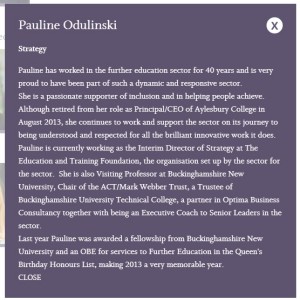The Education and Training Foundation has acted over conflict of interest concerns surrounding interim director Pauline Odulinski after a £100k contract was awarded to a firm where she worked.
The foundation last month gave the contract to develop a learning technologies self-assessment tool to Surrey-based Coralesce — where Mrs Odulinski is employed as a project manager.
It was the second foundation contract Coralesce has won, following an £83k contract award in January for “strategic consultation on VET, technology in teaching and higher level apprenticeships — technology in teaching”.
A foundation spokesperson insisted its tendering processes had been “open and competitive” and neither had involved Mrs Odulinski.
But FE Week also found that Mrs Odulinski’s Coralesce role was not listed in her foundation website biography (pictured right). Nor was her foundation role of interim director of strategy, quality and research listed on the Coralesce website.
“My online biography on the foundation website does not cover all my outside activities as these are intended to be snapshots, painting a brief picture of roles and experience,” she told FE Week.
“However, in order to be as open and transparent as possible I have now updated this with the information about Coralesce.”
The move was welcomed within the sector, with a warning about the need to avoid the potential appearance of conflicts of interest.
Jayne Stigger, former head of maths and science (HE) at North East Surrey College of Technology (Nescot), who last year warned the foundation about the perception of a “jobs for the boys” approach after senior roles were filled despite no advertising having taken place, said: “Those awarding contracts in FE, need to act with the utmost integrity and ensure that all information is in the public domain when funding/employment decisions are taken.
“It is essential that those involved with the foundation declare their interests and that websites, blogs etc, are updated to reflect relationships before decisions are made public. Clarity is essential.
“I am pleased to see that they have now done so. However, by acting after the event, the foundation may have left itself open again, to comments of conflicts of interest or the appearance of conflicts of interest.”
Ms Stigger, who plans to launch consultancy/training company FE Culture, added: “If the tendering process was all above board as they say, why was all relevant information not made public?
“Either they are not aware or they simply do not realise how these errors can be interpreted? Neither is encouraging. We need to know that those who set our professional standards are above suspicion and careful with our reputation.”
The latest Coralesce contract is part of the foundation’s learning technologies programme and comes just under a year after it ripped up a number of contract bids received under an old non-competitive tendering process in a move toward openness and transparency.
Mrs Odulinski, a former principal of Aylesbury College, said: “I am currently the interim director of strategy, quality and research at the foundation, and before that I was interim director of leadership, management and governance for a short period.
“I also have been part of an Association of Colleges project with eight colleges (Worcester is the lead) as the curriculum project manager. Coralesce provided the project management for this funded project and I was contracted by them for this work.
“The foundation has a declarations of interest register in place for interim and associate staff and it is aware of my roles outside of my work for the foundation, including this one, and have been since my appointment.”
She added: “The senior leadership team at the foundation, and many of our staff, have been recruited for their wide range of sector experience and it is to be expected that we will have contact, and involvement, with key sector players and organisations. However, the systems and safeguards that are in place at the foundation ensure that our tendering processes are open, transparent, and robust.”
No one from Coralesce was available for comment.



